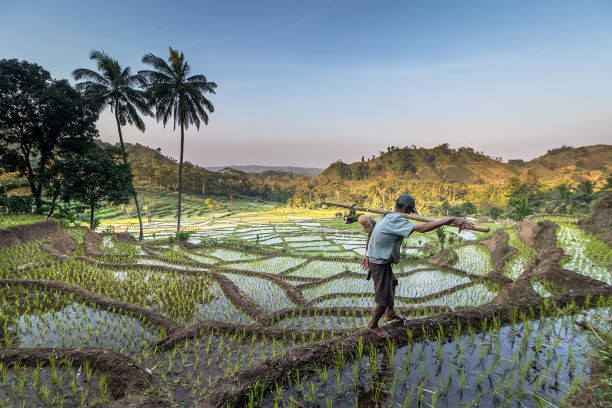Popular Reads
Top Results
Can't find what you're looking for?
View all search resultsPopular Reads
Top Results
Can't find what you're looking for?
View all search resultsAlternative rice products see double digit growth in demand amid trade disruption
Change text size
Gift Premium Articles
to Anyone
T
he disruptions to trade and falling imports caused by the COVID-19 pandemic have led to a double-digit increase in demand for locally produced, high-quality, alternative rice products, farmer cooperatives have reported.
Sales of high-quality foreign rice varieties and organic rice products such as Japonica rice, Basmati rice, Jasmine rice, and high-protein black rice have increased by 20 percent, Mintogoro Cooperative chairperson Hery Sugiarto told The Jakarta Post on Monday. The cooperative is based in Demak, Central Java.
“Alhamdulillah [thank God] the pandemic impacted our business positively rather than the other way around, as demand for our products has increased 20 percent,” he said during an online webinar held by the Indonesian Seed Cooperative (Kobeta).
The market for foreign rice varieties in Indonesia is relatively small compared to regular rice. According to the latest available data compiled by the Agriculture Ministry, Indonesia imported 295,714 tons of “special” rice varieties compared to 987,500 tons of medium-grain rice in 2016.
Read also: Ministry ramps up rice production amid farmers' losses
The special rice varieties comprise Thai hom mali, basmati, japonica, brown and low-glycemic rice, according to the ministry’s data.
Despite the niche market for the products, Hery said the worldwide disruptions to trade had impacted rice imports, increasing demand for the cooperative’s products.
According to Statistics Indonesia (BPS) data, the country booked a 14.28 percent year-on-year (yoy) decrease in imports between January and June.
Furthermore, the rise of Indonesia’s upper-middle class has also supported demand growth for more expensive special rice varieties, which are considered healthier than regular rice.
“We are targeting the growing upper-middle class segment. As they’re extremely concerned with product quality, we pack our products neatly and market them through online marketplaces to attract customers,” he said.
Amid the growing demand for special rice varieties, Hery said high-quality seeds and fertilizers were crucial for successful cultivation. However, he added that the seeds sometimes were difficult to find.
Meanwhile, the chairperson of the Bali-based Jagadhita Farming Cooperative, Nyoman Suma Artha, voiced similar concerns, and urged the government to focus on improving fertilizer and seed quality to increase yields.
Nyoman said farmers in Bali could increase their rice production, in yield per hectare, by up to 5 tons by using high-quality fertilizers and seeds, double the yield rate of lower quality fertilizers.
“We could produce between 8 to 10 tons of dried grains [per ha] if we use high-quality fertilizers and the right techniques, while lower quality fertilizers and seeds produce only around 5 tons [per ha],” he said.
The Agriculture Ministry has set a rice production target of 62.5 million tons for 2021, 5 percent higher than this year’s target.
Read also: Virus, climate change cause food shortages in parts of Indonesia
The government has allocated Rp 18.4 trillion (US$1.26 billion) for the ministry’s 2021 budget, of which around half has been allocated for programs to ensure the availability and accessibility of high-quality food.
However, Agriculture Minister Syahrul Yasin Limpo said on July 7 that the allocation would not be enough to finance policies to ramp up food production, and proposed an additional Rp 10 trillion in next year's state budget to finance its planned policies.
“The Rp 18.4 trillion budget allocated to the ministry for 2021 is far from sufficient for the economy to recover after the COVID-19 pandemic in villages that heavily rely on agriculture, and to meet the food production target set in the government’s working plan,” Syahrul said in a hearing with the House of Representatives.
In 2019, prolonged drought led to a decline in Indonesia’s rice production, which was down 13.2 percent year-on-year to 16.1 million tons in the first half of 2020, according to the World Food Programme’s (WFP) Indonesia office.










